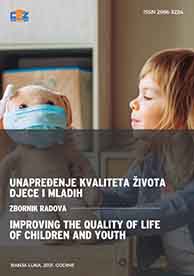UTICAJ IGRE I GEJMIFIKACIJE NA UNAPREĐENJE KVALITETA ŽIVOTA STUDENATA
THE IMPACT OF THE GAME AND GAMIFICATION ON IMPROVING STUDENTS' QUALITY OF LIFE
Author(s): Dušanka Slijepčević, Biserka KošaracSubject(s): Social Sciences, Education, Sociology, Social development, Distance learning / e-learning
Published by: CENTAR MODERNIH ZNANJA
Keywords: game; practice; gamification; quality of life; youth;
Summary/Abstract: The paper is focused on describing and functionally and causally explaining the importance of the game and of learning through the game (gamification) for the quality of life of students in the Republic of Srpska, in the first half of the 21st century. The issue discussed is reflected in the insufficient research into knowledge about and attitudes of students in the Republic of Srpska, as the main consumers of higher education services, towards the importance of the game and of learning through the game (gamification) for improving the quality of life of individuals and social groups in society. For that reason, the research is conducted on students of social sciences and humanities in the two public universities in the Republic of Srpska - University of Banja Luka and University of East Sarajevo, from the perspective of (narrow) scientific areas of Theoretical Sociology, Methodology, and Special Sociology. For the purpose of furthering knowledge about the importance of the game and learning through the game (gamification), a hypothetical framework is set: 1) The game in learning contributes to increasing the degree of free thinking and action of students from the Republic of Srpska in the first half of the 21st century (main hypothesis); 2) E-learning through the game enables experimental development for the benefit of individuals and society (auxiliary hypothesis); 3) E-learning through the game, due to easily accessible software applications, reduces social exclusion, which is a major issue in the society of Bosnia and Herzegovina (auxiliary hypothesis); 4) E-learning through the game represents the future of education and is a guarantee for the sustainability of society. (auxiliary hypothesis) The results of the research refer to the new knowledge, acquired on the basis of two fully and one partially confirmed hypotheses: 1) that the game in learning contributes to an increased level of thinking and actions of students, due to the exposure to gamified environment knowledge, to the motivation to learn and save time, and to memorizing (long-term memory) of learning contents, adopted through the game; 2) that e-learning through the game enables experimental development, for the benefit of individuals and society, and 3) that e-learning through the game, due to easily accessible software applications, reduces social exclusion, which is a major issue in the society of Bosnia and Herzegovina.
Journal: DRUŠTVENE DEVIJACIJE
- Issue Year: VI/2021
- Issue No: 6
- Page Range: 178-188
- Page Count: 11
- Language: Bosnian, Croatian, Serbian

